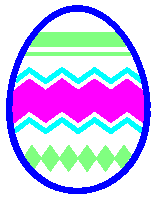Easter - Date of Easter Sunday for PDAs

See the download page to obtain this program
The Easter program displays the date of Easter Sunday for years in the Gregorian calendar. The algorithm is taken from `Puzzles and Paradoxes', T. H. O'Beirne, 1965 (p. 180). Although the program does something useful, it may be of more value as a training exercise for the relevant platform.
None of the versions of the Easter program collect, store or transmit any user data, personal data, or data about the device running the program. In particular, none of the types of user data defined by Google Play are used.
This version was created for Android 2.0 onwards. It can be downloaded from the Google Play Store. The application does not require much screen space, so it looks somewhat sparse on a larger device (e.g. a tablet).
This version was created as a Midlet for J2ME 2.0 using the Wireless Toolkit. The code is a bit oriented towards Sony Ericsson mobile phones.
 This program was developed
at a point when Palm screens were 160x160 and does not work well on larger
screens
This program was developed
at a point when Palm screens were 160x160 and does not work well on larger
screens
This version was created for PDAs (PalmOS 3.0 onwards and the like). The program does not contain native code. Instead it is executed by the SuperWaba Virtual Machine (a kind of Java VM). If you have not already installed this, download the SuperWaba for your hand-held device. Once you have done this you can run a variety of SuperWaba programs, and not just Easter. Although the program should run on a large variety of devices, it has been tested only on a couple of Palm devices. The program has been developed with version 3.0 of the SuperWaba VM. It should work with similar SuperWaba versions, but past experience suggests that other versions may be incompatible.
The distribution provides the source code, the binary for PalmOS (Easter.prc and Easter.pdb), and the binary for WinCE (Easter.lnk and Easter.wrp). Install the relevant pair of binary files as you would for any other program on your hand-held. Launch and run it as normal. It will call the SuperWaba VM automatically to run the code.
If you wish to re-build the code from source, you will need to download the SuperWaba SDK (Software Development Kit). Note that SuperWaba may not be compatible with recent JDKs. Use the Makefile if you have the Make utility. Alternatively, under MS Windows use the Build and Clean batch files. If you have not already set up PATH and CLASSPATH, you will need to do this in these files.
This program is free software. You can redistribute it and/or modify it under the terms of the GNU General Public License as published by the Free Software Foundation - either version 2 of the License, or (at your option) any later version.
This program is distributed in the hope that it will be useful but without any warranty, without even the implied warranty of merchantability or fitness for a particular purpose. See the GNU General Public License for more details.
The algorithm is due to T. H. O'Beirne. The Android icon is based on a Corel example.
Version 1.0: First public version, Ken Turner, 6th December 2001
Version 1.1: Changes to track SuperWaba evolution, Ken Turner, 20th August 2002
Version 1.2: New versions for Android and J2ME, Ken Turner, 3rd August 2011
 Up one level to Mobile Utilities
Up one level to Mobile Utilities